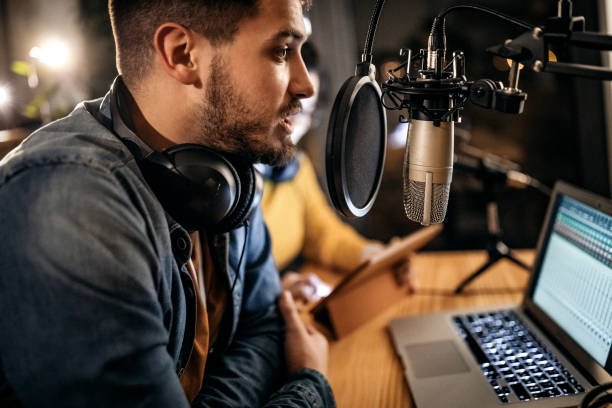How to become a radio newsreader in South Africa: If you are interested in pursuing a career as a radio newsreader in South Africa, there are a few steps you can take to increase your chances of success. Here is a guide on how to become a radio newsreader in South Africa:
- Get an education in journalism or broadcasting: Most employers prefer candidates with a degree or diploma in journalism or broadcasting. Many universities and colleges in South Africa offer relevant courses, such as the University of Johannesburg, University of Pretoria, and Cape Peninsula University of Technology.
- Gain experience: Practical experience is crucial to becoming a radio news reader. You can gain experience by interning or volunteering at a radio station or community radio, working as a news reporter, or hosting a news show on campus radio.
- Develop your skills: Radio news readers need to have excellent communication skills, a clear speaking voice, and the ability to read and interpret news scripts. You can improve your skills by practicing reading news scripts out loud and taking courses or workshops on public speaking and voice modulation.
- Build a demo reel: A demo reel is a collection of your best work that showcases your skills and abilities as a radio news reader. It should include examples of news segments you have read, interviews you have conducted, and any other relevant work you have done.
- Network: Attend industry events, join professional organizations, and connect with other professionals in the field. Networking can help you learn about job openings and meet potential employers.
- Apply for jobs: Once you have gained the necessary education, experience, and skills, start applying for radio news reader positions. Check job boards, company websites, and industry publications for job listings.
Job descriptions for radio news readers in South Africa may include responsibilities such as:
- Preparing and presenting news bulletins on air
- Gathering news stories and conducting interviews
- Writing and editing news scripts
- Working closely with producers and editors to ensure accurate and timely reporting
- Monitoring news sources and staying up-to-date with current events
- Operating broadcast equipment and software
- Participating in station events and promotions
- Building and maintaining relationships with listeners and sources
Becoming a radio news reader requires dedication, hard work, and persistence. But with the right education, experience, skills, and network, you can succeed in this exciting and rewarding career.
Skills to master as a Radio Newsreader in South Africa
As a radio newsreader in South Africa, there are several skills that you should master to excel in your role. These skills include:
- Proficiency in multiple languages: In South Africa, there are 11 official languages, and a good newsreader should be able to communicate effectively in at least two or three of these languages.
- Strong communication skills: Clear, concise, and accurate communication is essential when delivering news on the radio.
- Excellent reading skills: Newsreaders must be able to read scripts fluently and with appropriate intonation to keep the audience engaged.
- Ability to work under pressure: The news is constantly changing, and radio newsreaders must be able to deliver breaking news stories quickly and efficiently.
- Good writing skills: Newsreaders may be required to write and edit their own scripts, so good writing skills are essential.
- Familiarity with technology: Radio newsreaders should be comfortable using modern broadcasting technology and software.
- Knowledge of social media: Many radio stations also have a strong social media presence, so understanding how to engage with audiences on platforms like Twitter and Facebook is important.
- Good time-management skills: Newsreaders must be able to manage their time effectively to meet deadlines and broadcast schedules.
- Attention to detail: Accuracy is critical when delivering news on the radio, so newsreaders must pay close attention to detail.
- Ability to work independently and as part of a team: Newsreaders may work independently, but they must also collaborate with producers, editors, and other team members.
- Developing good habits: Being punctual, disciplined and having a positive attitude are some of the good habits that one needs to develop in order to be a successful radio newsreader.
Video: Skills you need to become a radio presenter!
In addition to mastering these skills, radio newsreaders in South Africa must also navigate the unique challenges of working in a diverse country with a complex history. Understanding the cultural context and being sensitive to issues like language, identity, and race is important for building trust with audiences and delivering news in a responsible and ethical manner.
Where to study Newsreading/ Radio Presenting
- Oakfields College offers a short learning programme in radio and TV presenting that covers topics such as voice training, scriptwriting, interviewing skills, studio production, and media law. The course is part-time and runs for 10 weeks.
- Boston Media House offers a diploma in radio and television production that covers topics such as radio broadcasting, audio production, TV presenting, video production, media studies, and journalism. The course is full-time and runs for three years.
- Wits Radio Academy is a centre of training, research and public engagement in the field of radio. Based at the University of the Witwatersrand, it offers courses such as a certificate in radio production, a postgraduate diploma in media management, short courses on various aspects of radio, and online courses on podcasting and digital storytelling.
- The Academy of Sound Engineering offers a diploma in sound engineering that covers topics such as audio technology, music production, sound design, live sound reinforcement, studio recording, mixing and mastering. The course also includes modules on radio broadcasting and TV production.
- The National Electronic Media Institute of South Africa (NEMISA) offers a diploma in broadcasting that covers topics such as radio production, TV production, journalism, media law and ethics, digital media literacy, and broadcast management. The course also includes practical training at community radio stations or TV studios.

